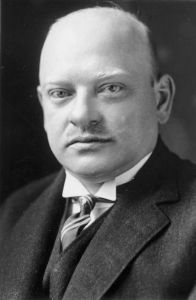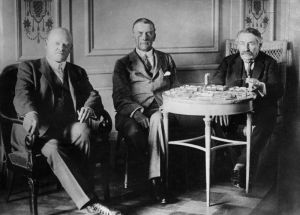A German political personality
 In February 1927, a distinguished German politician, winner of the Nobel Peace Prize, arrived in Sanremo: "sick with nerves", as some newspapers of the time wrote, he needed to take a break, tired and fatigued by his numerous government commitments.
In February 1927, a distinguished German politician, winner of the Nobel Peace Prize, arrived in Sanremo: "sick with nerves", as some newspapers of the time wrote, he needed to take a break, tired and fatigued by his numerous government commitments.
We are talking about Gustav Stresemann, born in Berlin on 10 May 1878 and a German politician.
From August to November 1923, in the period of the Weimar Republic and during the French and Belgian occupation of the Ruhr, he became Reich Chancellor and Foreign Minister, remaining so until his death. For his energetic efforts to reconcile with France he was awarded the Nobel Peace Prize in 1926 together with his French colleague Aristide Briand.
For his energetic efforts to reconcile with France he was awarded the Nobel Peace Prize in 1926 together with his French colleague Aristide Briand.
They were both creators and signatories of the Locarno Pact (1925), which ended hostilities between Germany and France.
As foreign minister, he worked hard to normalise relations with France with a view to a political revision of the Treaty of Versailles (1919), concentrating on a multilateral insertion of Germany into the new order of the League of Nations and renouncing nationalistic impulses.
In fact, Stresemann was in San Remo for the first time from 8 February to 5 March 1927 and a second time from 12 to 29 March 1929, staying at the Hôtel Royal, always accompanied by his wife Käthe Kleefeld.
He was often seen strolling through the streets of Sanremo and holding conversations with politicians and local residents as well as Italian and foreign journalists.
In 1927 he was joined in Sanremo by the diplomat Konstantin von Neurath (1873-1956) and his wife.
Von Neurath was ambassador to Rome from 1921 to 1930 and later Foreign Minister of the Third Reich from 1932 to 1938.
Badly affected by the feverish work of the government as early as 1928, Stresemann died of a heart attack on 3 October 1929.
(taken from "La colonia tedesca a Sanremo e in Riviera", Alberto Guglielmi Manzoni, pages 161-173 in the book "Sanremo e l'Europa, l'Immagine della Città tra Otto e Novecento" edited by Letizia Lodi; published by Scalpendi, 2018)




